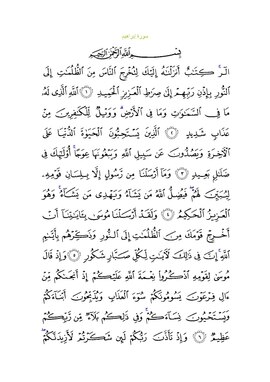Ibrahim (surah)
| إبراهيم Ibrāhīm Ibrahim | |
|---|---|
| Classification | Meccan |
| Other names | Surat Ibraheem, Surah Ibrahim, Sura Ibrahim |
| Position | Juzʼ 13 |
| Hizb no. | 26 |
| No. of verses | 52 |
| No. of Rukus | 7 |
| No. of Sajdahs | none |
| Quran |
|---|
Sūrat Ibrāhīm (Template:Lang-ar, "Abraham") is the 14th sura of the Qur'an consisting of 52 ayat. It is a Makkan sura.
The sura teaches a lesson, which is that Allah knows what we declare or conceal, and nothing is hidden from him, either in the Earth or the Heavens. He is the All-Knower.

Name
This Chapter name is Surah Ibrahim, named after the Prophet Ibrahim, or Abraham. He is discussed of much importance in the surah.
Content
Part of the surah refers to those who deny the messengers, the truth, and the hereafter. When they will see it before their eyes on the day of resurrection, where they will wish they would have obeyed their messenger as to avoid their eternal reside in Hell, as it is told in verse (14:44) "And, [O Muhammad], warn the people of a Day when the punishment will come to them and those who did wrong will say, "Our Lord, delay us for a short term; we will answer Your call and follow the messengers." [But it will be said], "Had you not sworn, before, that for you there would be no cessation?"[1]

